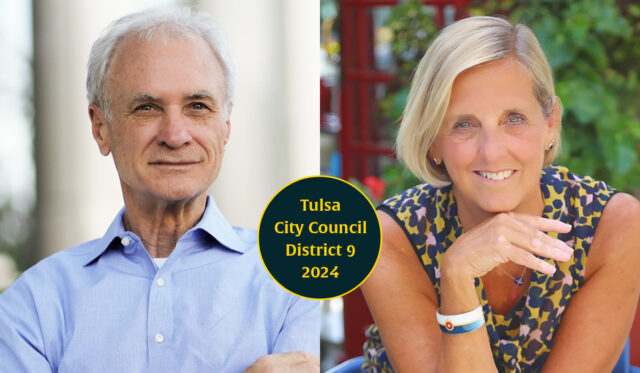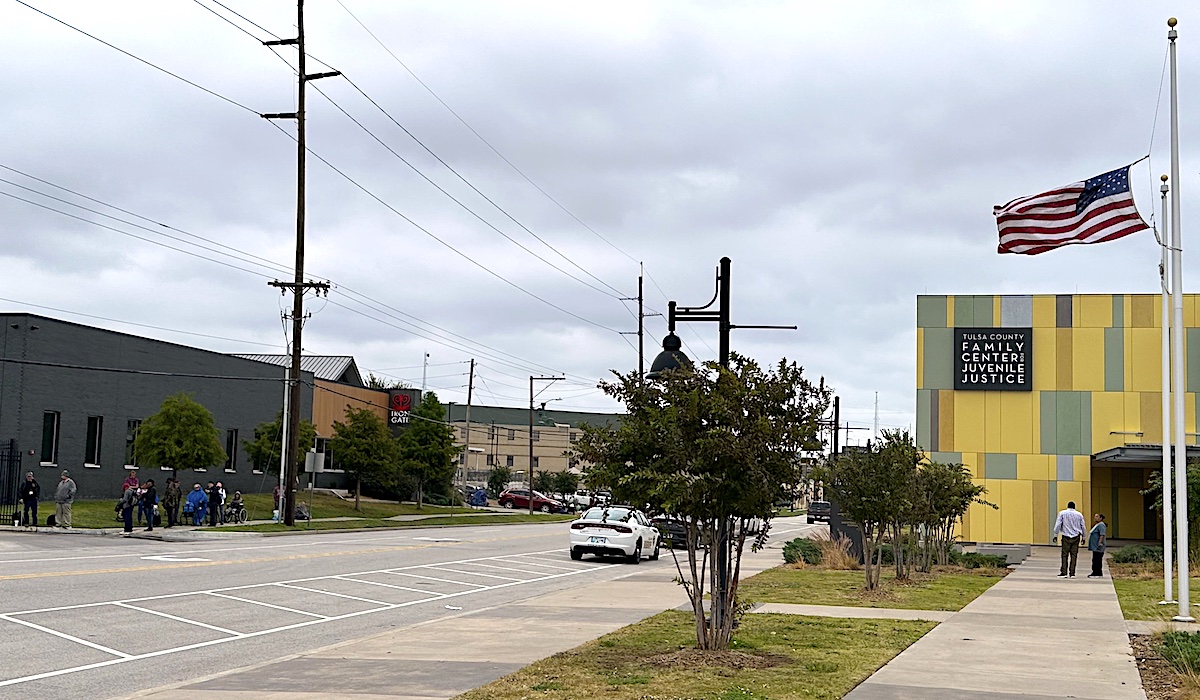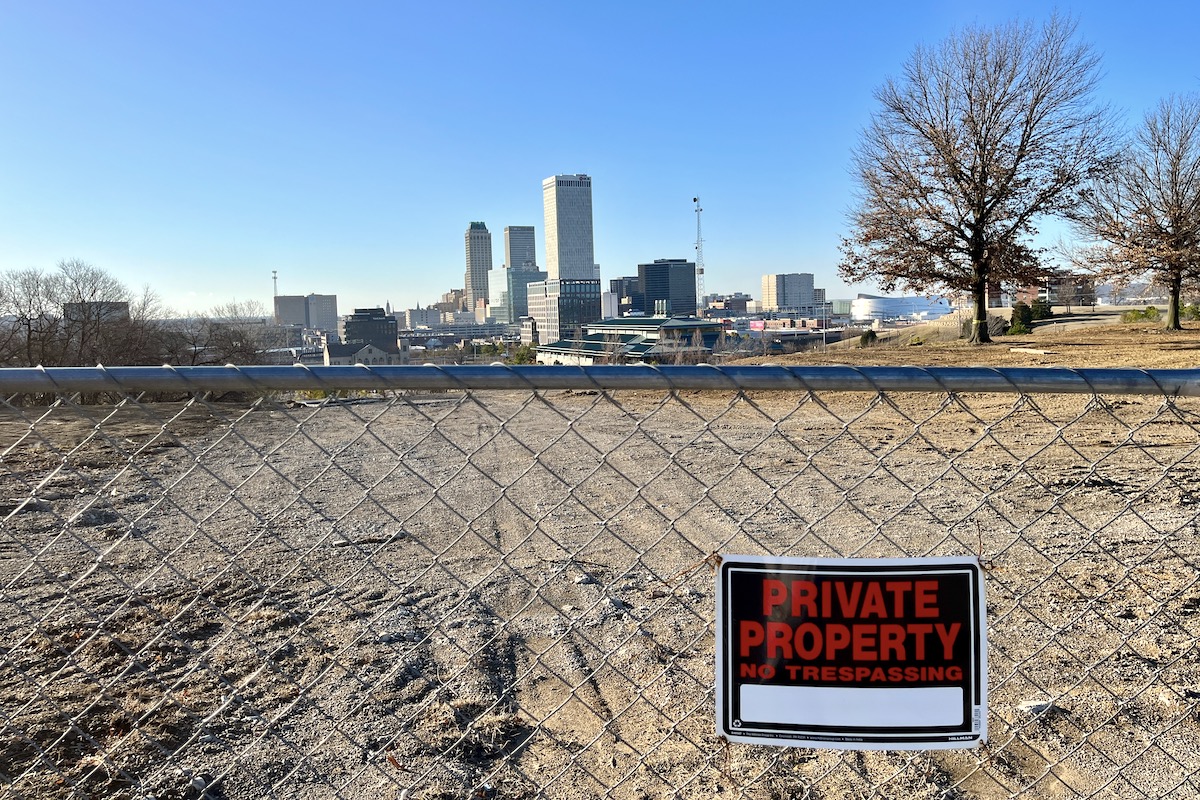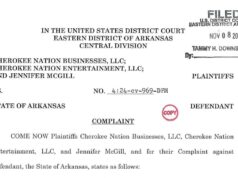

Five months ago, Tulsa City Council District 9 two-term incumbent Jayme Fowler was running for mayor of Tulsa against well-known and well-financed candidates. As the candidate filing period approached, he suddenly announced a decision to forgo a mayoral bid. Instead, after briefly saying he would sit out Tulsa’s 2024 cycle altogether, he filed for reelection, finished second among five candidates in August and now faces former Oklahoma House Rep. Carol Bush in a head-to-head matchup for another two-year term Nov. 5.
“We took a look at the polling data, and Karen (Keith) was raising money a year before she announced, and Monroe (Nichols) had been raising money, too. I was a little naive in thinking that I could raise a million and catch up,” Fowler said of his exit from the mayoral race. “I looked at the polling data, and I think sometimes we all make decisions that aren’t grounded in logic and are made out of emotion, and I think I got to the point where I said I’m going to drop out of the mayor’s race and run for reelection.”
For Bush, who represented House District 70 for three terms, running for the Tulsa City Council offered a new outlet for the public service she wanted to continue after briefly considering a 2024 mayoral run herself.
“After six years as a state representative for the Tulsa area, I left on my own accord,” she said. “I was ready to come home and focus more specifically on Tulsa issues, even though a lot of the bills I ran were Tulsa-related. I felt like I could have a more direct impact on the city council.”
Before her legislative service, Bush worked as executive director of the Tulsa Crime Prevention Network for a decade. Fowler has worked in finance for 35 years. In addition to his work, he lends his time to the Tulsa Memorial High School High School Foundation.
Tulsa City Council District 9 covers a south-central portion of the city, spanning north of Interstate 44 to 31st Street and south to 71st Street between the Arkansas River and Sheridan Avenue.
Candidates hear homelessness, housing complaints

As Bush and Fowler have campaigned, they say several issues always seem to be on the top of people’s minds. Among those are housing and Tulsa’s homeless population. Tulsa has about 1,400 chronically unhoused people, according to its last point-in-time count earlier this year.
Bush said expansion of services for those experiencing homelessness poses a top challenge for city governments to face.
“That’s the No. 1 issue I hear about from people,” she said. “It’s from the standpoint of both wanting to help but also the illegal activities that can come with it. That can be breaking into homes or assaulting people or camping out in front of stores so that people can’t get their businesses to open. It makes it intimidating for customers. We have some areas that are so bad with panhandling — like 51st and Harvard — where people won’t buy gas because they are being asked for money.”
Fowler has also heard similar complaints from constituents.
“We’re challenged by it like every big city,” Fowler said. “We are doing some progressive things. We’re doing a low-barrier shelter by Mohawk Park with wraparound services. There will be social workers. When they’re admitted, they can start working on the things that got them on the streets in the first place, whether that’s substance abuse or other problems. I think it’s a positive step in helping people get their lives back.”
Slow Tulsa development process ‘kind of a joke’

Both Fowler and Bush said Tulsa needs to step up its game when it comes to development and make it easier for those interested in developing the city to get projects started, permitted and inspected. Bush said other cities in the metro are ahead of Tulsa in those terms.
“The whole process of getting work done is laborious, and it takes forever,” Bush said. “I know of a guy who has been sitting on land for over a year because of the lack of continuity from one of the inspectors to the next. We have a real problem in that area. Broken Arrow knows that we’re kind of a joke. They’re saying to people who want to build there that they’re open for business.”
Fowler said there are some ways to relieve the logjam of permits and inspections, depending on what type of housing is being developed.
“I think we have a big challenge as far as permitting and inspections,” he said. “If you’re a developer who has built low-cost starter homes, then those delays can eat into the profits. One of the things we’re starting to do is use some manufactured homes in northeast Tulsa. They’re built in a factory and assembled on-site. When you do that, you’re no longer under the guise of permitting and federal guidelines, and with those done away with the cost goes down.”
‘It’s not sexy to talk about sewer lines’
Bush said Tulsa has a lot going for it, including culture in the form of arts and entertainment, museums and the BOK Center.
However, she remains concerned about what’s underneath the streets and whether the city’s resources are being put to their best use. She cites what she calls the “sidewalk to nowhere” in one part of Tulsa where a sub-division of homes on large lots have sidewalks even though the broader area does not.
“We need to spend time and resources dealing with this,” she said. “Our infrastructure is aging. We have sewer lines in neighborhoods that have serious issues because of that. It’s not sexy to talk about sewer lines, but we have a problem with them. We have people dealing with things like groundwater coming into their faucets at home. The city needs to put a plan together to improve and replace aging infrastructure. We have a lot of clay pipes. Nobody uses clay anymore.”
Fowler argued that, in some respects, Bush misunderstands the problem and is oversimplifying the solution. He said there is not one type of pipe that meets every need.
“She has suggested HDPE pipe, but if we did that the city would likely have only one source to supply the pipe going into the ground,” he said. “She alluded to clay (pipes), but those are slowly but surely being done away with and upgraded. I think there’s a lot to this issue.”
How they differ
Asked what differentiates him from his opponent, Fowler pointed to his experience representing Tulsa City Council District 9 for two terms, as well as his experience in the private sector.
“I hold my opponent in high regard and esteem, but if you look at the council now, you have eight councilors who are involved in nonprofits and one person in private business,” he said. “I’ve spent my whole life in the private sector, and I understand what it takes in other world-class cities.”
Bush said that, if elected, being on the council would be her full-time job. Bush said her experience in the Legislature — where she passed bills extending the statute of limitations for prosecuting sex offenses committed against minors and authorizing harm-reduction or “needle exchange” programs — also bolsters her resume.
“One of the things that differentiates me from my opponent is that I treat this as my full-time job, and I return all my emails and phone calls,” she said. “Sometimes you’re not going to like the answer. Not all issues are fixable, but even just through my door knocking I’ve been able to solve a couple of issues for people. I will always be accessible and accountable, and I want to hear ideas from people, because I think together we can solve a lot of problems for the city and make it a better place to live.”
The Tulsa World’s editorial board has endorsed Bush in the Tulsa District 9 race.




















